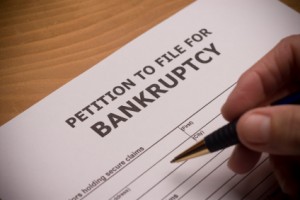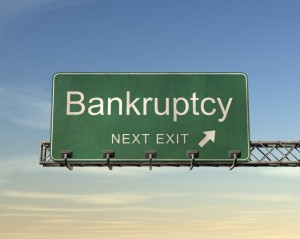1. What is a Chapter 7 bankruptcy and/or a Chapter 13 bankruptcy?
Chapter 7 bankruptcy is a liquidation proceeding. The debtor turns over all non-exempt property to the bankruptcy trustee who then converts it to cash for distribution to the creditors. The debtor receives a discharge of all dischargeable debts usually within four months. In the vast majority of cases the debtors have no assets that they would lose so Chapter 7 will give that person a relatively quick “fresh start”.
Chapter 13 Bankruptcy is also known as a reorganization bankruptcy. In Chapter 13, the debtors retain ownership and possession of all of their assets, but must allocate their future income to repaying creditors, generally over a period of three to five years. The amount to repay depends on how much is earned, the amount and types of debt owed, and how much property is owned.
Perhaps most significantly, Chapter 13 offers homeowners an opportunity to save their homes from foreclosure. Under this chapter, homeowners can stop foreclosure proceedings and pay mortgage or car arrearages current during the next 30-60 months. This prevents the need to do so immediately to avoid foreclosure or repossession. Nevertheless, all mortgage payments are due during the Chapter 13 plan on time.
Another benefit of a Chapter 13 bankruptcy is the debtors may retain all their property that would otherwise be liquidated by a Chapter 7 bankruptcy Trustee.
2. If I file for bankruptcy can I keep my property?
Probably. When you file a Chapter 7 bankruptcy you are allowed to keep certain property that is deemed “exempt,” subject to a monetary limit. Under Nevada law, you are allowed to keep your house, car, clothing, jewelry, bank accounts, household goods, money and so on. However, issues surrounding exemptions can be quite complex and you should discuss your case with an attorney.
If you file for Chapter 13 bankruptcy, you don’t have to hand over any of your property. Instead, you repay your debts out of your income. In exchange for keeping your property, your plan will have to pay your creditors at least the value of your nonexempt property.
3. Can I keep my car and/or house after bankruptcy?
Probably. Regardless of whether you file Chapter 7 or Chapter 13 bankruptcy, you are allowed to keep your car and/or home as long as the equity in such property does not exceed Nevada’s exemption limit. Equity is what the property is worth minus what you owe on it. So, if your car is worth $10,000 and you owe $5,000 on it, there is $5,000 in equity.
In Nevada, you are allowed to protect up to $550,000 of your home’s equity and $15,000 in your car’s equity. For example, if your house is worth $200,000, and you owe $98,000 on a first mortgage and $2,000 in taxes, you would have $100,000 in equity, ($200,000 less total mortgages and liens of $100,000), and thus, be able to keep your house.
However, even if you qualify to keep your house and/or car because your equity in these properties does not exceed Nevada’s exemption limit, you can only keep them if you are current on these payments. If you are not current, you can file Chapter 13 bankruptcy that will allow you to repay the past-due amounts over three to five years. Your lawyer will be able to guide you in this regard.
4. Can bankruptcy stop foreclosure?
Yes. When you file bankruptcy an automatic stay goes into effect, which will prohibit any creditors from trying to collect the debts you owe, including a foreclosure on your home. It’s automatic because no action is required to obtain the stay other than filing your bankruptcy petition.
5. Will bankruptcy stop creditors from trying to collect the debts I owe?
Yes. Again, when you file bankruptcy the automatic stay prohibits any creditors from trying to collect the debts you owe. Thus, a creditor cannot continue pursuing collection actions (calls to your home, work, cell phone, letters, lawsuits, and so on) after a bankruptcy case is filed.
6. Can I stop a garnishment of my bank account or paycheck?
Yes. Almost all garnishments can be stopped with the exception of child support or spousal support obligations. Some creditors that hold claims that will not be discharged like student loans can start garnishment again as soon as your discharge is entered.
7. How long will a Chapter 7 or a Chapter 13 bankruptcy stay on my credit report?
A Chapter 7 will stay on your credit report for 10 years from the date of filing and a Chapter 13 will stay on the credit report for 7 years from the date of filing.
8. Will I be able to buy a car or a house after I have filed for bankruptcy?
The simple answer is yes. Most individuals will be able to purchase a car within a few months of their bankruptcy case being discharged. Therefore, a wise financial move may be to surrender a car that is upside down (meaning it has a lot of negative equity). An individual should be smart and shop around for the best offer and not accept the first car creditor’s offer that is presented to them.
In regards to purchasing a house, realtors advise waiting at least 2 years before becoming eligible to qualify for a home mortgage. However the individuals must keep their credit in good standing during this time and try to rebuild their credit by obtaining one or two debts and keep them current. Remember, a bankruptcy stays on an individual’s credit report for 10 years but does not keep one from rebuilding credit during that time.
9. May employers or governmental agencies discriminate against someone who files bankruptcy?
No. It is illegal for either private or governmental employers to discriminate against a person as to employment due to bankruptcy. It is also illegal for local, state, or federal governmental units to discriminate against a person as to the granting of licenses, including driver’s license, permits, student loans, and similar grants because that person has filed bankruptcy.
10. May bankruptcy eliminate my second mortgage?
Yes, but only if you file a Chapter 13 bankruptcy petition. If you have multiple mortgages on your home and the balance on the first mortgage is greater that what your house is currently worth, your attorney can ask the court to strip away your second mortgage. Your second mortgage can then be converted to unsecured debt and included in a Chapter 13 Bankruptcy repayment plan, where at the end of the repayment period any remaining amount will be discharged.
11. What’s a discharge?
A discharge is an order from the bankruptcy court stating that you are no longer obligated on any of the debts you listed in your bankruptcy case, therefore the creditors no longer have the right to collect those debts. In most cases, it is the reason a person files bankruptcy. In a Chapter 7 case, the court issues the discharge order about three months after the 341 hearing. In a Chapter 13 case, the court issues the discharge order about one month after you have made all the payments required under your Chapter 13 plan.
12. Which debts are dischargeable?
If the bankruptcy court grants a discharge in your bankruptcy case, you are no longer legally obligated to pay most debts such as:
- credit card balances
- deficiencies on auto repossessions
- medical bills
- judgments
- personal loans.
In order for debts to be discharged, they must exist on the date the bankruptcy case was filed and be properly listed in the bankruptcy.
In addition, creditors are prohibited from attempting to collect a debt that has been discharged. Therefore, creditors cannot contact you by mail, phone, or otherwise, file or continue a lawsuit, or attach wages or other property. It is important to understand that if a creditor has a security interest against your property (personal or real) and you are not current on those payments, they may still proceed against that security interest and try to take back possession. They may not, however, seek to collect any money from you for a debt that has been discharged.
13. What debts are not dischargeable in bankruptcy, or in other words, which debts will I be required to pay back regardless of bankruptcy?
As a general rule, certain debts cannot be discharged, and thus, you are still legally obligated to pay these debts. These include taxes (in most cases), alimony, child support, student loans, criminal fines, debts related to drunk driving, debts not listed in the bankruptcy petition, and certain debts incurred within 60 days of filing the petition.
A few exceptions to the general rule of nondischargeability exist, but they are difficult to establish and typically require a filing with the Court of, in addition to the Chapter 7 petition, a Complaint to Determine Dischargeability. For example, 11 U.S.C.A. §523(a)(8) allows a student loan to be discharged if it is (1) not “insured or guaranteed by a governmental unit,” and not “made under any program funded in whole or in part by a governmental unit or nonprofit institution.” A student loan may also be discharged if repaying it will “impose an undue hardship on debtor and the debtor’s dependents.” But the “undue hardship” exception is difficult to establish. Any questions regarding these debts should be discussed with your attorney.
14. How long does it take to obtain a discharge?
In a Chapter 7 case, the court issues the discharge order about four to six months after the filing of the petition. In a Chapter 13 case, the court issues the discharge order about one month after you have made all the payments required under your Chapter 13 plan.
15. Will bankruptcy affect my spouse?
Your spouse will not be affected by your bankruptcy if they are not responsible (did not sign an agreement or contract) for any of your debt. If they have a supplemental credit card they are probably responsible for that debt. However, in community property states, such as Nevada, either spouse can incur a debt without the other spouse’s signature on anything, and still obligate the marital community. There are a few exceptions to that rule. For instance the purchase or sale of real estate requires both spouses’ signatures on contracts. But the day to day debts, such as credit cards, do NOT require both spouses to have signed.
Your lawyer will be able to guide you in this regard.
16. I am a co-signer for a debt. How does bankruptcy affect my obligation?
If the debt is primarily your debt, then you must provide for payment under your Chapter 13 plan. If the debt is primarily the debt of the person with whom you co-signed, then you may provide for payment of the debt under your Chapter 13 plan. If your plan does not provide for full payment of the co-signed debt, the creditor could get permission from the Court to collect the debt from the co-debtor. While you are in Chapter 13, and if your plan provides for full payment of the debt, the co-debtor is protected against collection efforts outside the Court.
17. Will I have to go to court?
In a Chapter 7 bankruptcy case, you generally would not have to appear in court. Debtors are required to attend a creditors’ meeting at the Trustee’s office, during which the Trustee and creditors can ask the debtor questions regarding their finances. In a Chapter 13 bankruptcy case, there is a plan confirmation hearing that is also required.
Randy Creighton, Esq.

 Black & LoBello will host a seminar discussing Bankruptcy and Divorce on February 25th, 2011 at 10 AM. This seminar is open to anyone seeking answers to the following questions:
Black & LoBello will host a seminar discussing Bankruptcy and Divorce on February 25th, 2011 at 10 AM. This seminar is open to anyone seeking answers to the following questions: A common tool used to avoid probate is to own a bank account jointly with the right of survivorship held by a family member or friend. Bank accounts held jointly with the right of survivorship avoid probate because, upon death of a co-owner of the account, the funds in the account immediately transfer ownership to the surviving account holder. However, before adding a child or family friend to a bank account, be aware that if the person added to the account files for bankruptcy, the funds held in such joint bank account could be seized by the Bankruptcy Trustee.
A common tool used to avoid probate is to own a bank account jointly with the right of survivorship held by a family member or friend. Bank accounts held jointly with the right of survivorship avoid probate because, upon death of a co-owner of the account, the funds in the account immediately transfer ownership to the surviving account holder. However, before adding a child or family friend to a bank account, be aware that if the person added to the account files for bankruptcy, the funds held in such joint bank account could be seized by the Bankruptcy Trustee. The federal government provided new Home Affordable Modification Program (HAMP) outreach and communication guidelines for foreclosure actions while evaluating the borrower. These guidelines provide additional protection for delinquent borrowers who have filed bankruptcy but would otherwise be eligible for HAMP benefits. Some key highlights from the directive include:
The federal government provided new Home Affordable Modification Program (HAMP) outreach and communication guidelines for foreclosure actions while evaluating the borrower. These guidelines provide additional protection for delinquent borrowers who have filed bankruptcy but would otherwise be eligible for HAMP benefits. Some key highlights from the directive include:
 New Las Vegas bankruptcy data and Nevada bankruptcy data released by the government last week details just how bad the Nevada bankruptcy situation remains. The data set paints a grim economic picture, reinforcing the need for an experienced bankruptcy lawyer to help guide you through the process at a time when Nevada bankruptcy courts are experiencing unprecedented case volume.
New Las Vegas bankruptcy data and Nevada bankruptcy data released by the government last week details just how bad the Nevada bankruptcy situation remains. The data set paints a grim economic picture, reinforcing the need for an experienced bankruptcy lawyer to help guide you through the process at a time when Nevada bankruptcy courts are experiencing unprecedented case volume. 

